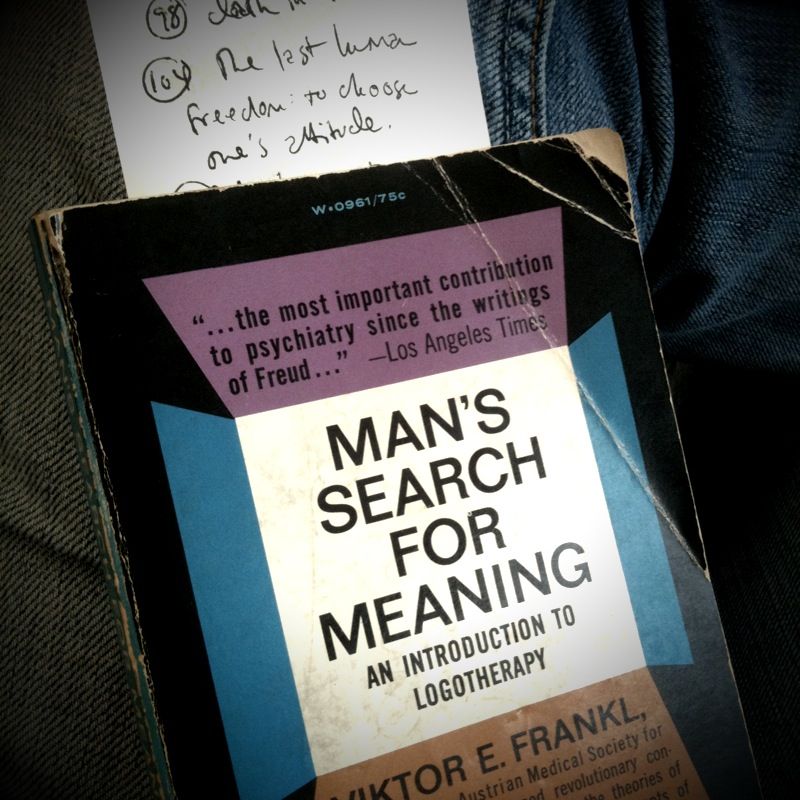
Thom Cuffin-Munday
This book was recommended to me by a very special person who was aiding me in my soul-searching, especially since going through many a mental health crisis and struggling to find a meaning to existence. Frankl’s book has been regarded as one of the most inspirational stories of the 20th century, describing his experiences of the Holocaust and using this as a basis to explain his alternative to psychoanalysis – logotherapy. The book itself is very short and sweet at only 170 odd pages and can easily be read within a few days to a week – I’m sure you could finish it in a day, but I would allow more time to process what you’re reading!
The book is divided into two sections, the first being an account of Frankl’s experiences as a Jew during the Holocaust, moving from different concentration camps and recounting the stories of his fellow camp inmates, and the second explaining ‘logotherapy’. Be warned, this book describes some very harrowing and distressing scenarios, as would be expected. However, as you’re reading the account, there are many parallels that can be made between Frankl and someone suffering with mental health problems. Now, it may sound brash to compare the plight of Jews in the 1940s to someone suffering mentally, but Frankl describes his experiences in such a way that he welcomes these sorts of comparisons. What I found particularly interesting is his description of human suffering. A key point he makes is that all suffering is relative to the individual, and so it is impossible to understand just how much someone is suffering unless you are in their shoes. He uses this to explain how invisible illnesses such as mental health problems or other diseases may not be obvious, but can have the same impact or worse than physical ailments. He writes:
A man’s suffering is similar to the behaviour of gas. If a certain quantity of gas is pumped into an empty chamber, it will fill the chamber completely and evenly, no matter how big the chamber. Thus, suffering completely fills the human soul and conscious mind, no matter whether the suffering is great or little. Therefore the “size” of human suffering is absolutely relative.
Man’s Search for Meaning, p. 55.
Frankl also describes how suicide was on the minds of nearly every inmate, and his explanation for finding meaning to life, even in the direst of conditions, is inspiring. As someone who has suffered with mental health for many years, reading this book helped me a great deal. Frankl stresses the importance of finding an individual, ultimate life goal, and with this, man’s ‘provisional existence’ is given meaning. Instead of asking for pity for my conditions, I have learnt to accept them. Frankl writes: ‘emotion, which is suffering, ceases to be suffering as soon as we form a clear and precise picture of it’. (p. 82.) Rather than asking what we expect from life, Frankl asks us to consider what life expects from us – he stresses that we have been put on this earth for a reason, and that through finding meaning to our suffering we can persevere through it.
In the second section of the book Frankl explains his concept of psychotherapy – in opposition to Freud and Jung’s psychoanalysis, Frankl proposes ‘logotherapy’, a method of therapy that focuses on the future rather than the past (as psychoanalysis tends to do), looking forward to life goals rather than backward at root causes. I found this part of the book very useful for analysing mental health as well, with Frankl’s techniques proving particularly resonant in this area. One example that really helped me was his use of ‘paradoxical intention’. This technique is used to conquer one’s fear of something by inviting the person to confront their fear, wish to be more afraid, and in such reverse the fear’s power over you. I used this technique immediately for sleeping, telling myself to try and stay awake for as long as possible because I was afraid of not getting enough sleep. I fell asleep within 20 minutes!
There are many practical applications to Frankl’s logotherapy, which all start with changing your attitude to your problems, taking them for what they are, and through acceptance and almost humorously dealing with them, you remove their power and can look to the future. If you, or anyone you know is struggling with the meaning of life, I would recommend this book heartily – it deals with some pretty tough topics, but the result is life-changing, literally. I am still searching for meaning, but the book certainly helped change my attitude and instigate this search. In the words of Nietzsche, ‘he who has a why to live for can bear almost any how.’
